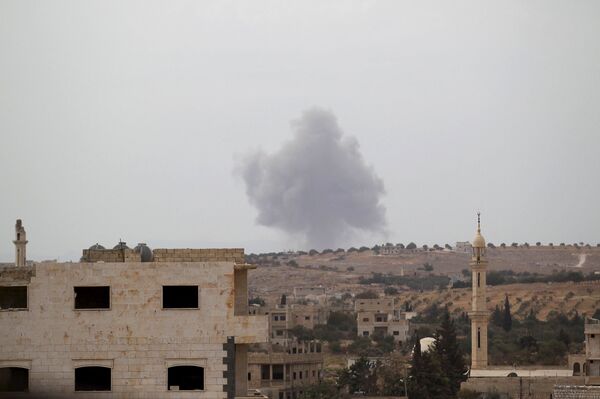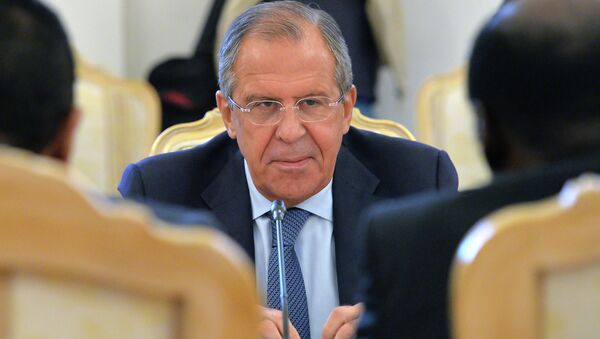MOSCOW (Sputnik) — Some 20 question asked at the event, that took over an hour, were devoted to the development and the consequences of the crises in the Middle East and the Russian role in their settlement.
Islamic State the Only Focus of Russian Airstrikes
Russia launched its first precision airstrikes on ISIL positions in Syria on Wednesday at the request of Syrian President Bashar Assad and with the coordination of the Baghdad Information Center comprising the resources of Russia, Iran, Iraq and Syria.

The foreign minister said that Russian airstrikes in Syria will not expand beyond the territory controlled by the Islamic State extremist group and stressed that Russia does not consider the Free Syrian Army a terrorist group.
"We believe that the Free Syrian Army should be part of the political process, like some other armed groups on the ground composed of the Syrian patriotic opposition. This is absolutely necessary for the political process to hold and to be sustainable."
According to the minister, at a ministerial UN Security Council meeting on Wednesday, many countries have shown an interest in a broad anti-terrorist coalition proposed by Russian President Vladimir Putin.
"I believe that many perceived positively and with interest President Putin's initiative on the need to create a broad anti-terrorism front that would be based on international law, the UN Charter, and that would act with the consent of and in close coordination with countries in the region."
The Russian top diplomat dismissed as preposterous claims that Syrian President Assad must be removed from power for Islamic State to be defeated.
"We cannot forget about the political process, but we cannot condition fighting ISIL [Islamic State] by changing the political system in Syria. We believe that, first of all, fighting terrorism must be a priority, but parallel with this, not after, but parallel with this, many things could be done on the political front."
He added that claims that Russia is engaging in the fight against terrorism in Syria in order to divert attention from the conflict in Ukraine are "absurd."
Russia Not Planning to Fight ISIL in Iraq, Arms Provision to Kurds
The foreign minister said that at the moment the country is not planning to expand its airstrikes from Syria to Iraq, as the Iraqi government has not officially asked Moscow for assistance.
Earlier in the day, Iraq's Prime Minister Haider Abadi said he would welcome Russian airstrikes on Islamic State positions in his country, as support provided by the US-led coalition against the group is insufficient.
"No, we are not planning to expand our airstrikes to Iraq, we were not invited, we were not asked."
He admitted, however, that Russia supplies Kurdish fighters with weapons through Iraq's government.
"We provide arms to the Kurds through the Iraqi government. And the information center which was established in Baghdad, it embraces representatives of the military of Iraq, Syria, Iran, Russia, and the Kurds are represented, the Kurdish autonomous government is also represented there."
Russian Cooperation With US-Led Coalition
Sergei Lavrov stressed that Russia and the international US-led coalition against the Islamic State share the common goal of defeating terrorists in Syria.
"As regards the targets of the coalition and the targets announced by Russia, we have the same approach, it's ISIL [Islamic State], [al-]Nusra, and other terrorist groups," the minister said.
However, according to Lavrov, Russia cannot be a part of the US-led coalition against the Islamic State as the coalition operates bypassing international law.
"For more than one year, the coalition has been bombing Syria without the consent of the Syrian government, without an 'OK' from the Security Council, without informing anyone…. We, indeed, are interested in cooperation with the coalition. We cannot be part of the coalition, which operates without the Security Council mandate and without request from one of the countries on whose territory they operate."
International law permits military action abroad only if approved by the Council, as an act of self-defense, or at the specific request of the country’s leadership.
Turning to Russia's relations with the West, Lavrov stated that Russia believes in collective action and joint efforts based on international law and "agreements reached and never broken."
Israeli-Palestinian Settlement Impossible Under Present Conditions
Speaking about another pressing conflict in the region, Lavrov said that the Middle East Quartet on Israeli-Palestinian settlement has been unable to achieve progress under the current conditions.
"The Quartet, unfortunately, can only speak at this time. It is not silent, but it does not do more than speaking… Everyone expresses dissatisfaction with this deadlock, but so far we are not able to move forward."
He continued that, "the Quartet adopted yesterday a statement which says almost everything we wanted to say, including [on] the settlements, including other unilateral steps, including the need to implement resolutions of the United Nations on the state of Palestine, on Jerusalem and so forth."
Russia, alongside the United States, the European Union and the United Nations, is a member of the Quartet on the Middle East, established in 2002, mediating a peace process in the long-standing Israeli-Palestinian conflict.
The Middle East Quartet issued a statement after the Wednesday talks between Russian Foreign Minister Sergei Lavrov, US Secretary of State John Kerry and EU foreign policy chief Federica Mogherini, reaffirming its commitment to a two-state solution to the Israeli-Palestinian conflict.

